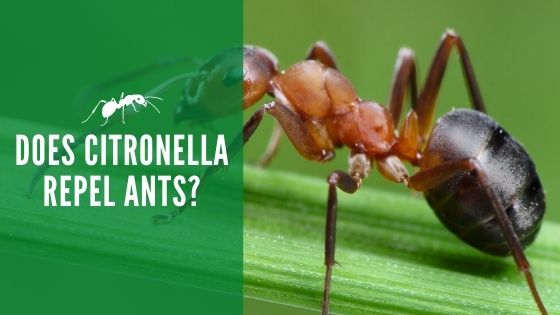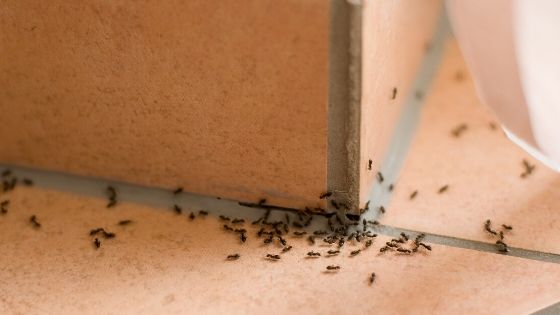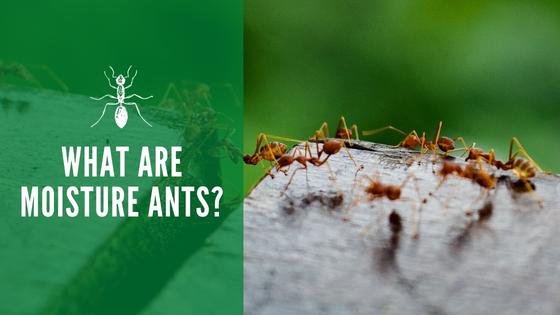Does Citronella Repel Ants?

No one likes having ants in their home. In the most minor of cases, they are extremely annoying and can get in the way. In major cases, they can form colonies inside the home and infest nearly everything. You can decide to put your foot down and make sure that no more ants get into the home, but that is much easier said than done.
If you don’t want your home filled with ant corpses, then you can consider repelling the ants instead. There are dozens of natural ways to repel ants and make sure that they never come into your home again, and one of them is Citronella.
What Is Citronella Oil?
Citronella oil is an oil that comes from the lemongrass plant, a plant that has been used with soaps, candles, and other perfume-based items. It smells quite nice and does have several uses because of its rather strong scent.
Citronella can repel ants, wasps, bees, roaches, gnats, ticks, fleas, moths, flies, and many other common household pests. This chemical-free option is gentle on the environment and has proven to be effective. In a 2011 study from the Malaria Journal, it was found that people have been using plants to repel mosquitoes as far back as the Greeks and Romans. Citronella is now one of the most popular natural ant repellents on the market.
How Does Citronella Oil Repel Ants?
Citronella oil is a non-toxic way to repel ants whenever the essential oil is applied to a surface area. The ants that it doesn’t repel it may even kill. In a Cornell University study, it has been shown that citronella oil can kill around 50% of the ant’s population in half an hour, with 100% of an ant colony killed in 24 hours.
Typically you can either use the oil as a bug spray by mixing 20 drops of oil into ½ a cup of vegetable oil and then mixing them. You can also soak cotton balls inside the oil and then place the soaked cotton balls at the baseboards, counters, and other places where ants might get into your home. If you know where the ant colony or anthill is, then you can make a spray and apply it to the vicinity of the anthills and other nesting sites.
Why Does Citronella Oils Spray Work?
If you happen to take a look at a bottle of your favorite insect repellent, you might find that citronella oil is one of the active ingredients.
Whenever you spray the essential oil onto your skin, you cover yourself in an invisibility blanket to the bugs, and the oil hides your scent from the pests. Additionally, it is very cheap and easy to incorporate into repellent sprays.
Mosquitoes can’t track you down if you’re wearing a scent that masks your smell, and ants will die if they come in contact with citronella oil.
Growing Your Own Citronella
If you want easy access to the citronella plant and the oil that can come with it, then you can easily grow the plant in your backyard. Even if you don’t have a green thumb, it can be pretty easy to grow the two seeds that the oil is created from. Lemongrass grows very easily in the ground just by being watered. It can grow in almost any area with full sun, making it a great addition to your garden.
The best time to plant lemongrass is in the spring once the frost is over, and once the stalks are twelve inches tall, you can harvest them. Then you can crush the stalks of the plants with a mortar and pestle before placing them in a carrier oil. Crush them enough to where the liquid comes out, but not enough to where the stalks are destroyed.
Carrier oil helps to dilute essential oils so they can be safely used around the house for you, and some of the most common examples are almond oil or coconut oil. You should crush the stalks, place the crushed stalks into a canning jar, and cover them before leaving the mixture for a few days. After about two days, you can strain the mixture and have citronella oil on command. Throw the bits of stalk debris away and then bottle the oil.
What Smells and Plants Do Ants Hate?
Other essential oils such as peppermint oil and citrus oil can help remove the influence of ants around your home, especially if you spray it around the areas where the ants are coming in.
Ants also hate cinnamon, vinegar, and diatomaceous earth. The DE doesn’t have a scent but instead has several tiny sharp rocks that cut into the ants whenever they walk across. DE kills ants on contact ants and deters others from stepping into your home.
Catnip, thyme, and rosemary are also great additions to your garden that allow you to repel ants naturally. If you don’t want to cover your garden with pesticides and chemicals, using natural remedies to repel the ants is the next best thing.
Conclusion
Citronella oil is an excellent way to ensure that ants are kept out of the house and that your home is still free from toxins. You just need to figure out where the ants are coming from and ensure that those areas are coated with the oil. If citronella oil doesn’t work for your ant infestation, you should contact a pest control professional as soon as possible.



